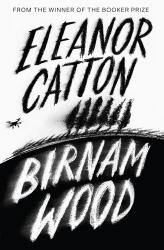One of the very best things about reading the entrants in the 2024 Ngaio Marsh Awards is just how varied a bunch of books they were. BIRNAM WOOD is a eco-thriller, set on New Zealand's South Island, serving up a hefty dose of challenges for the reader to be going on with.
The story is built around members of the Birnam Wood "collective" - a group involved in eco-activism through guerrilla gardening. As the blurb puts it:
An undeclared, unregulated, sometimes-criminal, sometimes-philanthropic gathering of friends, this activist collective plants crops wherever no one will notice: on the sides of roads, in forgotten parks, and neglected backyards.
Financially, they've always struggled, so when a series of minor earthquakes trigger a landslide near a small town on the South Island, an isolated, and seemingly abandoned farming property there, Thorndike, catches Mira's notice. This could be the way for the group to set up long term, under the radar, with room to expand. Only Mira's not the only person with an interest in this property, there's an enigmatic American billionaire, Robert Lemoine who has snatched up the place, keen on building a safe, secure, underground bunker, a prepper's paradise.
Meanwhile Mira's personal life is all over the place with her partner Shelley planning to leave the group and her, and ex-member, Tony, turning up after years away. There is a lot of tension amongst the Birnam Wood members, partly because of this latest move, partly because Mira's such a tricky character and partly because, well people.
On the face of it, there's cross over between Mira and Lemoine's aims, and the offer by him to allow Birnam Wood's working of the land seems above board. The tension in this story is all about whether or not they can trust each other, to say nothing of the triggers it's likely to pull for some readers.
There's something unflinching about the way that Catton dissects and perpetuates both the political zietgiest and societal norms, creating a hefty cast of expected characterisations, with unpleasant characters responsible for dealing out some hefty messaging along the way. Grating characters are always an interesting choice, and one that this author seems to be particularly adept at, even if at times this one went from demonstrating the awfulness of the world to being slightly inclined to lecture about it. It's also incredibly detailed writing, descriptive to the point of overblown, both lulling the reader into a flow that's slowed as a result, tipping towards irritation before finding a way back to story and intent.
Just to defy the sense of never-ending meandering about, the ending slipped effortlessly, albeit slightly surprisingly, into high-stakes thriller territory, which, to be frank, startled this reader to the point where I wondered if I'd accidentally flipped over to another book for a while. But then, as with THE LUMINARIES, this author is not about lulling the reader into a false sense of security, or predictability. I wrote of my experience with that book at the time:
Whilst the beauty of the writing doesn't let go, the plotting and devices used bury much of that in a frantic desire for something, anything passionate, committed or unexpected to happen. Something that says that yes, these are people who believe in what they are saying / doing / commenting on.
BIRNAM WOOD gave me the passionate, committed and, in the end, a bit of the unexpected as this reader finally twigged to the satire, the blackness of denial, the failure to snap out of it and see the obvious environmental challenges. But did these characters, this group of people believe in what they were saying / doing / commenting on? Couldn't tell, and I think that's part of what made it weirdly appealing.
Birnam Wood

Five years ago, Mira Bunting founded a guerrilla gardening group: Birnam Wood. An undeclared, unregulated, sometimes-criminal, sometimes-philanthropic gathering of friends, this activist collective plants crops wherever no one will notice: on the sides of roads, in forgotten parks, and neglected backyards. For years, the group has struggled to break even. Then Mira stumbles on an answer, a way to finally set the group up for the long term: a landslide has closed the Korowai Pass, cutting off the town of Thorndike. Natural disaster has created an opportunity, a sizable farm seemingly abandoned.
But Mira is not the only one interested in Thorndike. Robert Lemoine, the enigmatic American billionaire, has snatched it up to build his end-times bunker--or so he tells Mira when he catches her on the property. Intrigued by Mira, Birnam Wood, and their entrepreneurial spirit, he suggests they work this land. But can they trust him? And, as their ideals and ideologies are tested, can they trust each other?
Add comment